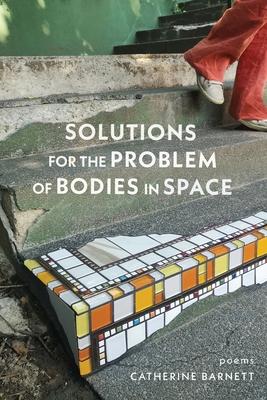The loneliness that collects in mirrors and faces--at bedside vigils and in city streets--quickens Catherine Barnett's metaphysical poems, which are like speculative prescriptions for this common human experience. Here loneliness is filled with belonging, which is in turn filled with loneliness, each state suffused and emptied by the other. Barnett's fourth collection is part manifesto, part how-to manual, part apologia: a guide to the homeopathic dangers and healing powers of an emotion so charged with eros, humor, and elusive beauty it becomes a companion both desired and eschewed, necessary and illuminating.
Solutions for the Problem of Bodies in Space is never far from grief or a comedy of bewilderment, inadequacy, hope. Entering Barnett's world is a little like entering an electrically charged cloud, and the prospect of either falling or getting caught in a storm brings vertiginous and unpredictable pleasures. Bristling with uncanny intelligence, the poems are sometimes quiet elegies, sometimes meditations on art, love, and the failures of love that so often define love. Barnett might be called a realist--her style is radiantly exact--yet somehow she is a guide both into and out of the existential void. She has written a tender, dazzling collection of estrangement and intimacy.

Solutions for the Problem of Bodies in Space: Poems
The loneliness that collects in mirrors and faces--at bedside vigils and in city streets--quickens Catherine Barnett's metaphysical poems, which are like speculative prescriptions for this common human experience. Here loneliness is filled with belonging, which is in turn filled with loneliness, each state suffused and emptied by the other. Barnett's fourth collection is part manifesto, part how-to manual, part apologia: a guide to the homeopathic dangers and healing powers of an emotion so charged with eros, humor, and elusive beauty it becomes a companion both desired and eschewed, necessary and illuminating.
Solutions for the Problem of Bodies in Space is never far from grief or a comedy of bewilderment, inadequacy, hope. Entering Barnett's world is a little like entering an electrically charged cloud, and the prospect of either falling or getting caught in a storm brings vertiginous and unpredictable pleasures. Bristling with uncanny intelligence, the poems are sometimes quiet elegies, sometimes meditations on art, love, and the failures of love that so often define love. Barnett might be called a realist--her style is radiantly exact--yet somehow she is a guide both into and out of the existential void. She has written a tender, dazzling collection of estrangement and intimacy.